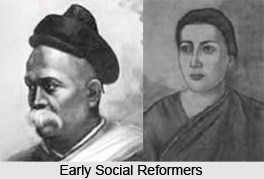Early Social Reformers have successfully contributed in eradicating the social evils and they have acted as the base upon which contemporary Social Reforms. While some of the eminent personalities voiced their support for women education, some Indian social reformers supported widow remarriage. Owing to their endeavours and reforms, Indian society underwent sea changes. In contemporary India the practice of Sati is banned; girls are provided proper education and most significantly, women are confident and aware to fight for their rights, irrespective of the fact they are homemakers or employed.
 Sri Narayana Guru was a prophet, sage and Hindu saint and also a social reformer of India. He was born in the family of Ezhavas, in a period when people from backward communities, like, the Ezhavas faced much social injustices in the caste-ridden Kerala society. Gurudevan, as he was fondly known to his followers, revolted against casteism and worked on propagating new values of freedom in spirituality and of social equality, thereby transforming the Kerala society and as such he is adored as a prophet. India as a whole may have produced its Gandhi, but Keralites are inclined to take more pride in their own great spiritual and social leader, the contemporary of Gandhi, the low-caste sage Sri Narayana Guru, with his tireless preaching of the doctrine of `One Caste, One Religion, One God.` He preached for moral and religious universalism.
Sri Narayana Guru was a prophet, sage and Hindu saint and also a social reformer of India. He was born in the family of Ezhavas, in a period when people from backward communities, like, the Ezhavas faced much social injustices in the caste-ridden Kerala society. Gurudevan, as he was fondly known to his followers, revolted against casteism and worked on propagating new values of freedom in spirituality and of social equality, thereby transforming the Kerala society and as such he is adored as a prophet. India as a whole may have produced its Gandhi, but Keralites are inclined to take more pride in their own great spiritual and social leader, the contemporary of Gandhi, the low-caste sage Sri Narayana Guru, with his tireless preaching of the doctrine of `One Caste, One Religion, One God.` He preached for moral and religious universalism.
Mahadev Govind Ranade hailing from Mumbai, was one of the most ardent supporters of women`s rights and liberation. Justice Mahadev Govind Ranade graduated from Elphinstone College in Mumbai and became a teacher and journalist. Like so many other young men of his generation, he questioned the customs and beliefs of his society. In 1869 Ranade joined the Widow Marriage Association, and in 1870 the Prarthana Samaj. At first, he and his colleagues were engaged in "intellectual protest against superficial dogmas untenable for a rational mind," but later they became more interested in social action. Ranade was a significant reformer who, in his own way, did much for the advancement of women from their repressive situation in nineteenth century India.
Tarabai Shinde was actually an associate of the social activists named Jyotirao Phule and Savitribai Phule and was a member of their Satyashodak Samaj ("Truth Finding Community") organisation. The Phules had actually started the first school for the lower class girls in the year 1848 as well as a shelter for upper class widows in 1854 (who were forced not to remarry), and also shared with the Shinde an awareness of the separate axes of oppression that also constitute gender and caste, as well as the mixed nature of the two.
Madhav Sadashiv Golwalkar instilled patriotism in the hearts of millions of youths of the country. He explained to them the Hindu way of life and philosophy in simple words. Like a true friend, he shared in the joys and sorrows of his countrymen. He transformed them into effective instruments for the worship of Bharat Mata as her worthy children. He demonstrated that strength derives from organization. He travelled untiringly through the length and breadth of the country almost a hundred times during the 33 years of his glorious tenure as Sarsanghchalak, kindling in the society the immortal flame of enduring love for the Motherland.




















